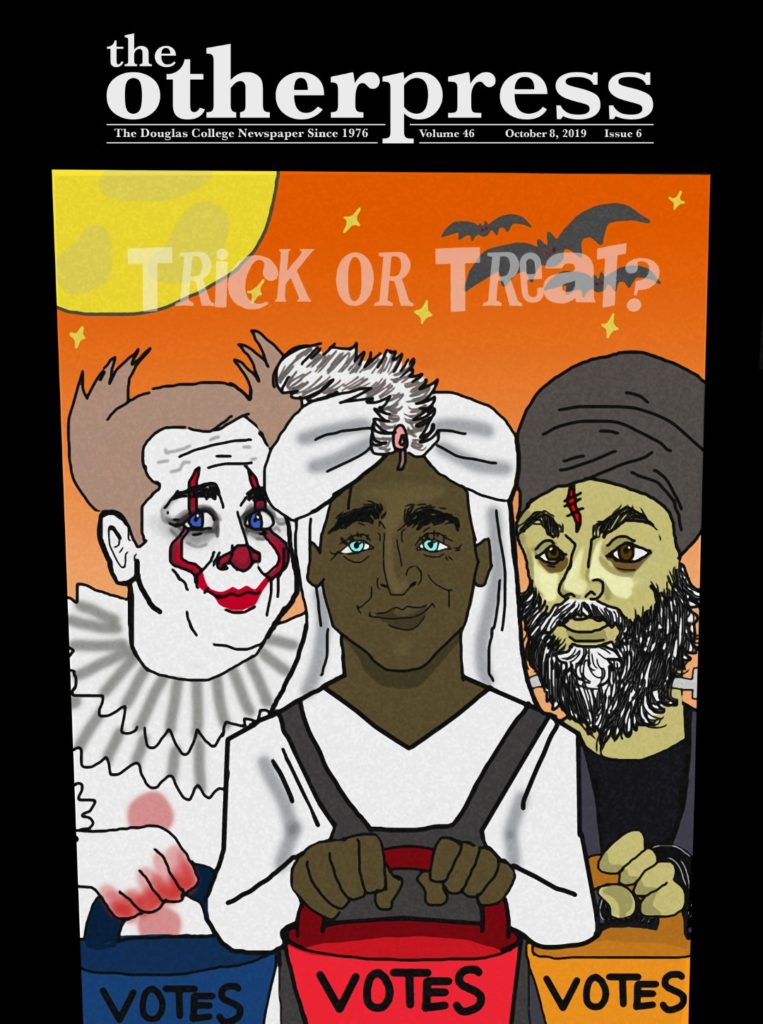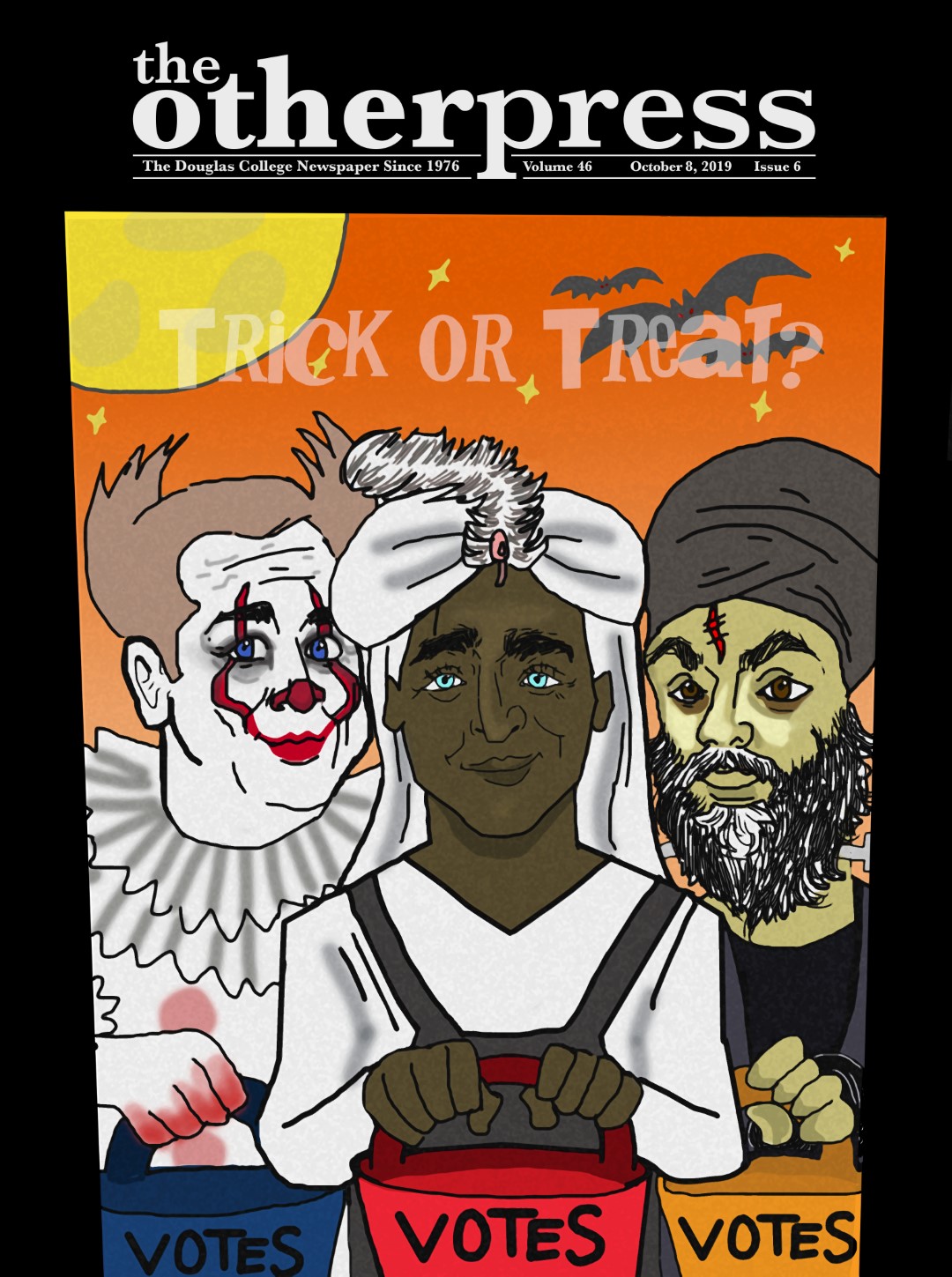
Cover design by Lauren Kelly
The Federal Election: parties, histories, and controversies
By Jessica Berget, Editor-in-Chief and Janis McMath, Assistant Editor
The Canadian Election is coming up, and so is my lunch.
Many Canadians feel scared of and stressed out by the election—and rightfully so, it’s overwhelming trying to navigate all the parties and their platforms. Don’t worry though, the Other Press obviously has you covered. As a disclaimer, this piece will focus on highlighting many of the negatives and controversies of each party. This focus is not to imply that your favourite party is awful, just that it is important to know the unfavourable points when making the ultimate decision of which party to vote for.
Liberal Party (led by Justin Trudeau)
Campaign focus:
According to the Liberal Party’s website, their top priorities include more money for the middle class, real action to address the climate crisis, and stronger gun control. In terms of climate action, if re-elected the liberals have promised to plant two billion trees, and with the force of nature, eliminate net emissions by 2050. They also plan to conserve 25 percent of Canada’s oceans and eliminate single-use plastics by 2021.
What the haters say:
Reasons people might cite to not vote for the Liberal party in the upcoming election is that Trudeau has already shown he is not fit to run this country since he has already put Canada in debt. According to the Toronto Sun, Trudeau was the largest accumulator of debt at 5.6 percent. Many also strongly disagree with his decision to let the pipeline be built even though he promised to make Canada more eco-friendly.
Controversy:
Oh boy, where to begin? His first scandal involved a trip to a private island of someone he said is a “close friend.” According to CBC, his close friend was Aga Khan, leader of the worlds Ismaili Muslim’s and chairman of the board of the Global Centre for Pluralism which the federal government pledged a $15 million dollar grant to back in July. Along with using a private jet, this resulted in Trudeau being found in violation of sections of the Conflict of Interest Act. Many also look to his recent brownface and blackface photos as evidence that he is hypocritical to his anti-racism platform. \
Green Party (led by Elizabeth May)
Campaign focus:
Elizabeth May and her Green Party have a consistent focus on the environment throughout their platform.
A few of the goals they list on their website include: reducing carbon emissions by 60 percent in 2030, terminating the Trans Mountain pipeline, “reviewing federal policy to align with the UN Sustainable Development Goals,” and “increasing contributions to the Green Climate Fund and Global Environment Facility.” Other non-environmental goals include making sex work legal, lowering the voting age to 16, and enacting Pharmacare for all by 2020.
What the haters say:
According to Global News, the Green Party’s budget has earned a failing grade from a team of expert economists at the University of Washington. The experts explain that there are “serious gaps” in both the Green Party’s spending plan of government money and in transparency.
An example of their high budget is highlighted by the fact that their universal Pharmacare would cost $26.7 billion in the first year—compared to the $10 billion NDP candidate Jagmeet Singh has pledged to spend. May says that Pharmacare does end up being quite a cost—and later states that “[the Green Party has] never been slavishly addicted to balanced budgets.”
Controversies:
In recent weeks, if you were to look at the Green Party’s homepage, you would’ve seen an image of Elizabeth May smiling while holding a reusable cup and a reusable straw.
According to the National Post, the photo was photoshopped—May was originally holding a plastic cup and a plastic straw. The instance is certainly silly, yet it highlights the important issue of a political leader’s ability to manipulate their image to fit what the voters want.
New Democratic Party (led by Jagmeet Singh)
Campaign Focus:
The NDP’s platform focuses on education, health care, and environmental issues. They promise to reduce tuition fees and student load interests and eventually move up to free education. They also say if elected they want to expand health coverage starting with universal healthcare by 2020, but no formal plan has been introduced. In terms of climate care, they want to reduce single-use plastics and power Canada with carbon-free electricity by 2030. They also propose to abandon the pipeline project Trudeau has started.
Controversy:
Some have accused Singh to be associated with a Sikh extremist movement. According to the Vancouver Sun, in 2015 he attended a rally where the speakers called for a separate Sikh nation known as Khalistan and honoured a violent militant.
Conservative Party (led by Andrew Scheer)
Campaign focus:
The Conservative platform is mostly focused on budgets and taxes. Scheer has promised to scrap the Trudeau carbon tax, which will lower the cost of everyday essentials such as groceries, gas, and home heating. He also wants to introduce the Universal Tax Cut, make maternity benefits tax free, add a child fitness tax credit which will let parents claim up to $1000 for sports activities, and add a children’s arts and learning tax credit which will allow parents $500 for arts and learning programs.
What the haters say/controversy:
The conservative party has been under a lot of scrutiny because of Scheer’s stance on gay marriage and abortion. He says he is “personally pro-life,” and that he has “made the commitment that as a leader of this party it is my responsibility to ensure that we do not re-open this debate.” There is also some controversy about their campaign since they do not have any policy proposals for a number of major issues.
People’s Party of Canada (led by Maxime Bernier)
Campaign focus:
Maxime Bernier is founder of the People’s Party of Canada (PPC). Bernier’s party was founded shortly after his resignation from the Conservative Party in 2018.
The PPC website lists their goals: balancing the budget, cutting taxes, eliminating third-world conditions on reserves, ensuring equality and independence for Aboriginals, support for the Trans Canada pipeline, reduce equalization payments to provinces to prevent the halt of provincial growth, and ensuring “that every candidate for immigration undergoes a face-to-face interview and answers a series of specific questions to assess the extent to which they align with Canadian values.” To clarify, the values PPC refers to is explained Bernier’s statement said at a rally in Toronto on July 23: “Our distinct values also include equality between men and women, the equal treatment of all citizens regardless of ethnicity, religion, or sexual orientation, the rule of law, [and] separation of state and religion.”
What the haters say:
Many of the PPC’s haters call the party racist and fascist, mostly referring to the party’s ideas on immigration. There have been several protests outside of PPC events, with one recently occurring in Vancouver. According to The Star, protestors held pro-refugee signs that said “no one is illegal.”
One does not have to look far to find someone that distains the PPC—according to iPolitics, Chad Hudson, former PPC candidate for a Nova Scotia riding gave up his position citing the PPC’s “values and the choices its leadership have made.” Also, according to Global News, Singh recently told Bernier that he “doesn’t think [Bernier] should have a platform.”
Controversy:
The PPC has certainly aroused a lot of controversy. Two notable controversies are his harsh criticism of climate-change activist Greta Thunberg and the party’s use of images of Japanese internment camps in advertising their campaign.
On the topic of Thunberg, Bernier tweeted that she is “clearly mentally unstable. Not only autistic, but obsessive-compulsive, […] she lives in a constant state of fear.” After a lot of backlash, Bernier responded with an apologist tweet stating “These groups use this young woman as a pawn and as a shield to prevent any criticism of the message. That’s the real scandal. I should have expressed this argument without referring directly to her personal situation.”
When campaigning their plan to repeal the Multiculturalism Act, the PPC used a photo of Japanese Canadians getting on a train at an internment camp. Many have condemned the use of the photo, including left-leaning activist George Takei, yet the PPC has still not issued an apology according to the Georgia Straight. The PPC has removed the image from their video, logically implying that they are aware of the controversy, yet they still have not made a statement on it.


